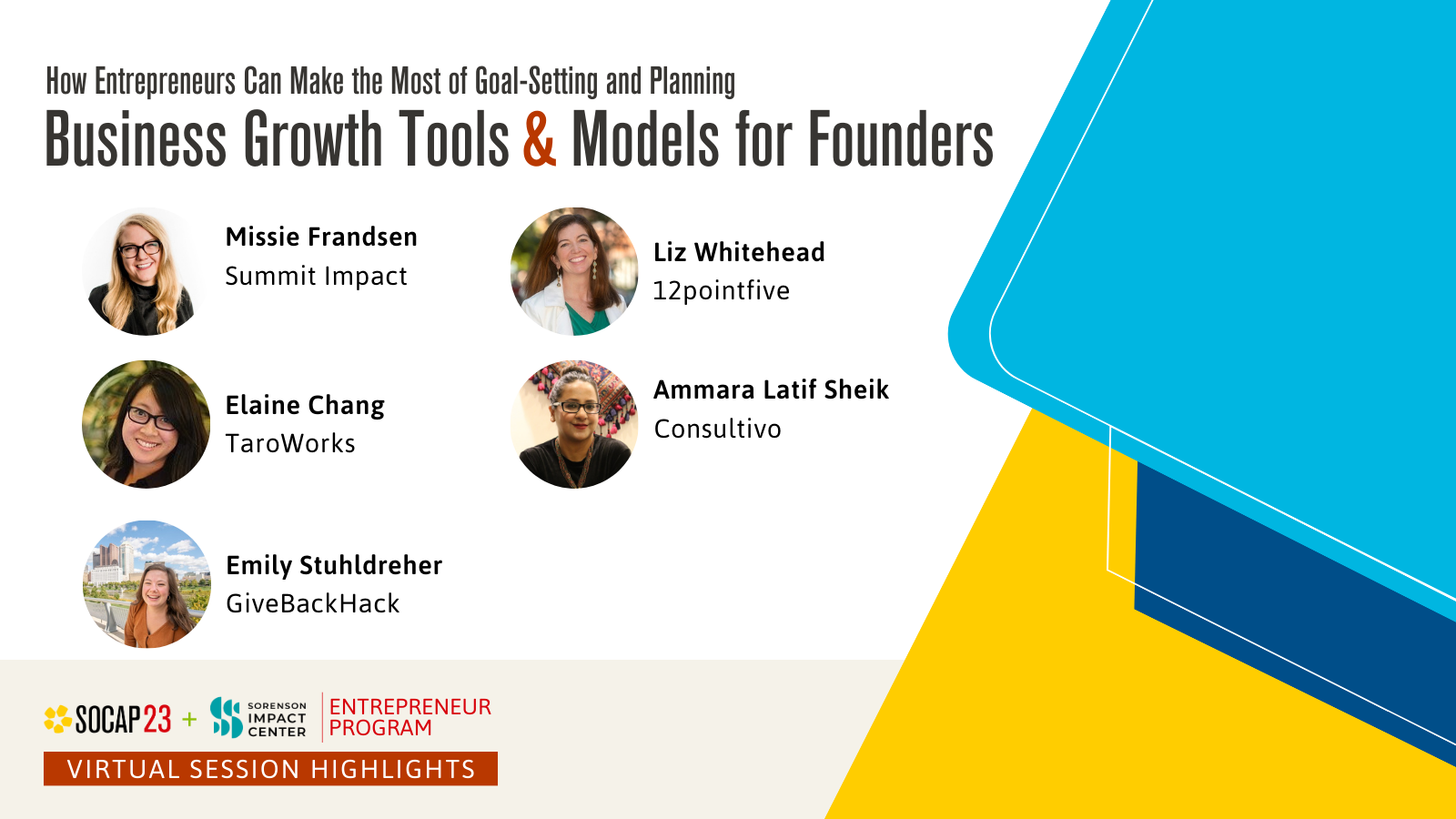While scaling a social enterprise, founders are tackling some of the world’s big challenges while also setting goals and managing growth. This year’s SOCAP23 Entrepreneur Program includes six monthly strategy tracks — including June sessions on business growth and expansion — to help founders enhance their impact and develop a nurturing framework for their businesses.
The virtual sessions for founders are facilitated by a variety of subject matter experts. We’re grateful for the knowledge, time, and guidance they are sharing with the founders and the broader SOCAP community.
At SOCAP23, you can hear from the SOCAP23 Entrepreneur Program cohort when they present on stage about the unique challenges their companies are addressing. They’ll also be actively connected to funders through deal rooms. Register now to join them from October 23 to 25 at Yerba Buena Center for the Arts in San Francisco.
Find highlights and takeaways below from the June sessions, which provided tips for goal-setting and planning as well as reviews of business models. Previous sessions featured a focus on team leadership and culture development in May and on holistic wellness in April. Watch for additional highlights in the months leading up to SOCAP23.
Virtual Tools Overview for Team Success
Presented by Missie Frandsen of Summit Impact, which gathers a community of diverse global business leaders, academic experts, and creative storytellers to support impact entrepreneurs through collective learning and collaborative action.
Takeaways and highlights:
- While numerous tools are available to help teams coordinate their communication and work, the biggest challenges result from a lack of understanding across teams about the systems already in place and how to appropriately use them.
- Considering tools for team coordination can be an overwhelming process. Many are beyond most small team budgets and take too much time to test to see if they will fit your team’s needs.
- The top tools we have identified for internal team collaboration and project management are Google Workspace and Google Calendar, Zoom, Calendly, Slack, Asana, Mural/Miro, Canva, and Otter.ai.
Leveraging Diverse Business Certification for Bigger Clients — and More of Them
Presented by Liz Whitehead of 12pointfive, who helps diverse companies leverage their business certification to find new opportunities and maximize their business development efforts.
Takeaways and highlights:
- Many large companies have goals to work with underserved/new majority communities and founders. To do that, they often require some certification to prove that your business fits their criteria for supplier diversity programs.
- To qualify for supplier diversity certifications, a business must be 51% owned, operated, managed, or controlled by people in the “new majority,” including people with disabilities, women, and/or people of color.
- Working with certified businesses can help large companies meet consumer demand and drive sales. Studies show that more consumers seek transparency and are more likely to buy products with certifications showing the social impact they create or support.
Data-Driven Decision-Making to Improve Impact and Operations
Presented by Elaine Chang of TaroWorks, a social enterprise that offers an advanced mobile data platform to help organizations working in remote areas enhance data collection, monitoring, sales, and inventory management.
Takeaways and highlights:
- While data is important for business decision-making and goal-setting, less than 1% of an organization’s unstructured data is analyzed and used to make decisions. Business leaders need relevant data that can be used to identify patterns and make concrete business decisions.
- Data can be used to determine where you’ve come from (“rear-view mirror”) as well as to predict future trends or behaviors (“headlights”).
- The key question to consider is what data is needed rather than what is available. Are you collecting data for data’s sake or being intentional about collecting and analyzing data to help determine business impact and direction?
Innovation in Business Models of Emerging Markets for Social Good
Presented by Ammara Latif Sheik of Consultivo, a development and corporate consultant that crafts high-end solutions for clients worldwide.
Takeaways and highlights:
- Investment is thriving in emerging markets, which serve as the “passport” for new investors because of options including startups, SMEs, and growth ventures.
- Why should we invest in emerging markets? The GDPs of countries with emerging markets have been steadily growing and improving over time, making them ripe for investment opportunities.
- Organizations that are helping to strengthen ventures in emerging markets include International Finance Corporation, International Trade Centre, WEConnect International, and Women Entrepreneurs Finance Initiative.
How to Take a Prototyping Mindset Through All Stages of Your Business
Presented by Emily Stuhldreher of GiveBackHack, which organizes events that bring together passionate community members to develop sustainable solutions to pressing social issues.
Takeaways and highlights:
- Prototyping is an effective way to try new ideas at any stage of your business, not just at the beginning of your concept.
- When you have a big idea, it’s important to break it down into individual components. That allows you to understand better where you might be able to find other organizations to partner with that are doing similar work toward the same goal, as well as identify synergies with other sectors or areas. It also lets you start trying ideas immediately instead of being bogged down by barriers and challenges.
- Being able to test ideas with smaller focus groups of potential partners or customers is a key part of the learning process with prototyping. This primarily empowers folks to own what they don’t know and determine how to address those challenges.
- “Do not wait until all conditions are perfect for you to begin. Beginning makes the conditions perfect” — Alan Cohen. Prototyping is equal parts action and listening, from sitting on an idea to getting useful information about it.
- It’s important to get comfortable with failure and failing forward. When something doesn’t work, it’s not inherently bad; it’s information that can help determine the next step.







